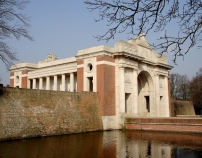| First Name: | John William | Last Name: | STARKEY | |
|---|---|---|---|---|
| Date of Death: | 07/11/1914 | Lived/Born In: | Leyton | |
| Rank: | Private | Unit: | Royal Welsh Fusiliers1 | |
| Memorial Site: | Menin Gate, Ypres | |||
Current Information:Age-25 23, Byron Road, Leyton Born-Bermondsey
First Battle of Ypres Between 21st October and 22nd November, 1914 a desperate fight took place around the Belgium city of Ypres, the first of three major battles that were to be fought there during the course of the war. British troops entered Ypres in October. The 1st and 2nd Divisions plus the 3rd Cavalry Division had made their way up from the Aisne as part of the “Race to the Sea”, whilst the 7th Division came west to Ypres after Antwerp had fallen. The Germans knew that Ypres was the gateway to the Channel ports and that these were vital to Britain’s war effort so they poured reinforcements into the area. The fighting fell into three distinct battles; the Battle of Langemarck, 21-24 October, the Battle of Gheluvelt, 29-31 October and the Battle of Nonne Bosschen, 11 November. Ypres did not fall to the Germans but its defence during these two months resulted in the destruction of much of the old regular British Army. During the Battle of Gheluvelt, the 1st Royal Welsh Fusiliers battalion of 22 Brigade, 7th Division, had been practically wiped out and the few who remained were temporarily attached to the 2nd Royal West Surrey (Queens) battalion. 7th November was a day of fighting all along the British line and also heavy shelling of both Ypres and Armentières. At 6.15 am, 22 Brigade attacked the German lines from a position, 500 yards north-east of Zwarteleen. Leading the attack was 2nd Royal West Surrey (Queens) with the remnants of 1st Royal Welsh Fusiliers still attached. Under the cover of heavy mist they went forward in two lines, some in the open, some in woods, 150 yards off. The firing of a gun was supposed to signal all other nearby troops to join in the counter attack, but in a battle this was probably not the wisest type of signal to use and only 1st Gloucestershire joined in. The first German trench was occupied and three machine guns captured but enfilade fire stopped any further advance. The Germans swept the area with all sorts of fire, many of the shells fortunately going over the heads of the British. At 4 pm, dusk was falling, the expected support of French troops north of the canal had not materialised, both flanks of 1st Gloucestershire were open and vulnerable, so the line was withdrawn to its starting position and 22 Brigade moved back into reserve. The Brigade’s casualties for the day were over 300 and included John Starkey from 1st Royal Welsh Fusiliers. |
||||
| « Back to Search Results | ||||
| If you think any of the information shown here is incorrect, Click Here to submit your amends and comments | ||||




